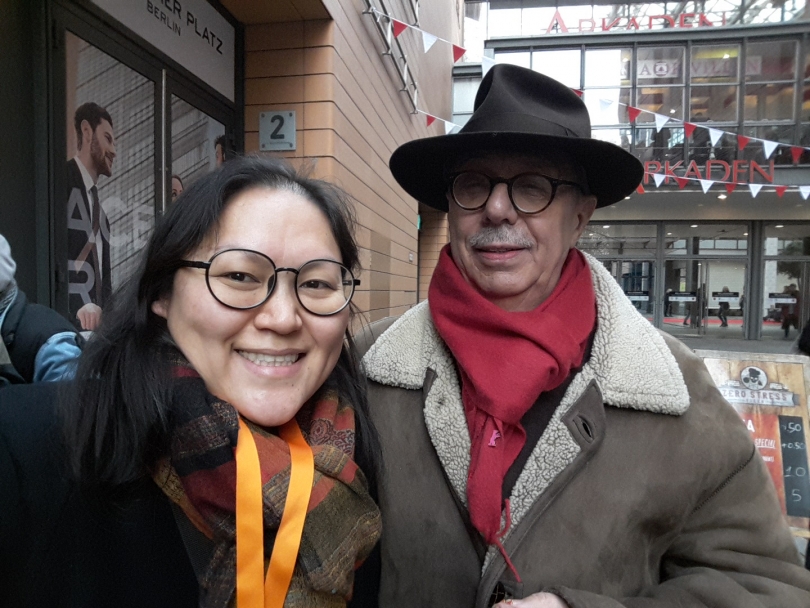|
|
||||||
|
Pro Tools
FILMFESTIVALS | 24/7 world wide coverageWelcome ! Enjoy the best of both worlds: Film & Festival News, exploring the best of the film festivals community. Launched in 1995, relentlessly connecting films to festivals, documenting and promoting festivals worldwide. Working on an upgrade soon. For collaboration, editorial contributions, or publicity, please send us an email here. User login |
Salazar's Spectacular "Sunday's Illness" Sadly Overlooked at Berlinale 2018
Ramón Salazar arrived at Berlinale 2018 with his spectacular fourth feature "La enfermedad del domingo" (Sunday’s Illness), starring the fierce Spanish actresses Susi Sánchez – as uptight wealthy mother Anabel who left her daughter 35 years before – and Bárbara Lennie – who vividly paints a picture of the pain the adult Chiara carries after having been abandoned at a young age. It's a bit of a surprise and a shame that "Sunday's Illness" did not receive more pomp and circumstance, especially since Salazar is no newcomer to Berlinale. In 2002 he premiered his debut film "Piedras" (Stones) in competition to rave reviews. At least his film did premiere in the magnificent Zoo Palast cinema, which has 850 plush leather seats. It was packed. Not only did I luck out to catch the official world premiere of "La enfermedad del domingo" (Sunday’s Illness) in the evening, I also saw it earlier in the day at the press screening. That is how much this film affected me. That's rare. The understated and powerful performances given by Sánchez and Lennie are a revelation. You feel the heartbreak of this daughter who holds the very fresh and deep scars of a mother's abandonment. Ramón Salazar’s direction and casting choices, with the help of Ana Sainz-Trápaga and Patricia Álvarez de Miranda, are spot-on. It almost feels as if this was first written as a play as the majority of the film is these two women alone in the woods, dealing with their serious relationship issues. Even though Salazar originally had an older actress planned to play Chiara, he clearly knew that he needed Lennie for the role after she blew him away at her audition. Many filmgoers might recognize Sánchez for her extensive film work, especially her collaborations with Pedro Almodóvar. It's a good thing that Salazar not only wrote the role with Sánchez in mind but that she was free with her busy shooting schedules. The original score by composer Nico Casal is slight, subtle yet affecting. It often lingers just long enough and at just the right pace, never being overbearing like many film scores are these days. The moments of silence and still frames are also just as important, if not more important, than the musical accompaniment. Clara Bilbao’s costume design perfectly reflects the sophisticated and somewhat restrictive Anabel during the first half of the film. Her outfits are grand and exquisite, recalling a nod to the Golden Age of Hollywood. On the other hand, Chiara is usually shown wearing casual clothes, often dishevelled and a mess in order to poke fun at her newly reunited mother’s way of life. The extreme shift of Anabel’s clothing speaks volumes about her character’s emotional development and her openness. Too bad there wasn't more screen time for Anabel's wardrobe because it was quite lovely to see flow across the screen. Perhaps half the film's budget was spent on Anabel's clothes. It would be interesting to find out how much was spent. DP Ricardo de Gracia’s framing and slow zooms on the two main characters and on trees in the forest haunting. They are deliberate and don't feel rushed, much like the soundtrack. The scenes with Sánchez and Lennie at Anabel’s extravagant mansion and later in the quaint village in the French mountains are lit to perfection. The cuts and editing also never seems unnecessary, which is a pleasant change. Teresa Font clearly had a complete understanding of Salazar’s methods, never hurried and instead portraying the actresses very realistically. One surprisingly violent scene is edited in such a way to cause a huge surprise scare. The slow build up of one character’s anger explodes into a sudden involuntary reaction. Raw emotion on screen. It gives me chills just thinking about it. The ending is on an entirely different level. I can't imagine that there was a dry tear in the house although perhaps it depends on one's mindset at the time or one's personal relationship with one's mother. It’s devastating and gorgeously shot. It’s a real pity that the world premiere of "Sunday's Illness" did not garner more attention. This film was, without a doubt, one of the genuine highlights of the festival putting more than a few of the films in competition to shame. The press conference with Salazar and his actresses shed some light into his own personal family history. One discovers that this theme is very close to his heart.
24.08.2018 | Lindsay R. Bellinger's blog Cat. : barbara lennie berlinale Ramon Salazar susie sanchez Fest. circuit FESTIVALS
|
LinksThe Bulletin Board > The Bulletin Board Blog Following News Interview with EFM (Berlin) Director
Interview with IFTA Chairman (AFM)
Interview with Cannes Marche du Film Director
Filmfestivals.com dailies live coverage from > Live from India
Useful links for the indies: > Big files transfer
+ SUBSCRIBE to the weekly Newsletter Deals+ Special offers and discounts from filmfestivals.com Selected fun offers
> Bonus Casino
About Lindsay R. BellingerThe EditorUser contributions |
||||

























